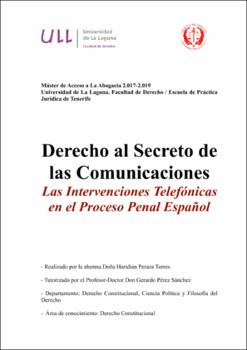Derecho al secreto de las comunicaciones. Las intervenciones telefónicas en el proceso penal español.
Autor
Peraza Torres, HaridianFecha
2021Resumen
El presente trabajo tiene por objeto el estudio del Derecho Fundamental al
Secreto de las Comunicaciones consagrado tanto en el artículo 18.3 de la
Constitución Española como en diversos textos de origen universal e
internacional, en íntima conexión con las Intervenciones Telefónicas en el
Proceso Penal Español, al ser éste el ámbito en el que el citado Derecho
Fundamental ostenta un papel protagonista.
Para ello, trataremos aspectos básicos del Derecho Fundamental al Secreto de
las Comunicaciones como es su regulación, concepto y fundamento, titularidad,
eficacia y comunicaciones reguladas; para posteriormente, entrar en el estudio
de las Intervenciones Telefónicas en el Proceso Penal, haciendo hincapié en
aspectos esenciales de la mencionada Diligencia de Investigación, teniendo en
cuenta la reciente reforma operada por la Ley Orgánica 13/2.015, de 5 de
Octubre, de modificación de la Ley de Enjuiciamiento Criminal para el
fortalecimiento de las garantías procesales y la regulación de las medidas de
investigación tecnológica que, como es sabido, ha logrado suplir la deficiente y
escasa regulación normativa en la materia Abstract. The present work aims to study the Fundamental Right to the Secret of the
Communications enshrined in the article 18.3 of the Spanish Constitution as
well in various texts of universal and international origin, in close connection
with the Telephone Interventions in the Spanish Penal Process, as this is the area
in which the aforementioned Fundamental Right has a leading role.
For this, we will deal with basic aspects of the Fundamental Right to the
Secret of Communications, such as its regulation, concept and foundation,
ownership, effectiveness and regulated communications; to subsequently enter
the study of Telephone Interventions in the Criminal Process, emphasizing
essential aspects of the aforementioned Diligence of Investigation, taking into
account the recent reform operated by the Organic Law 13 / 2.015, of October
5, of modification of the Criminal Procedure Law for the strengthening of
procedural guarantees and regulation of technological research measures that, as
is well known, have succeeded in supplying the deficient and scarce normative
regulation in the matter.





